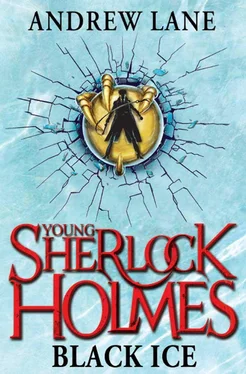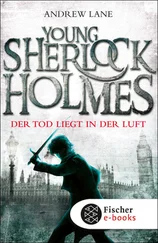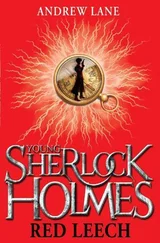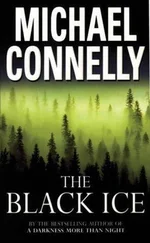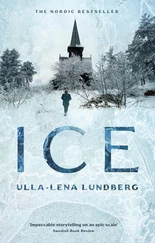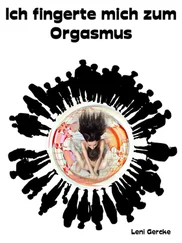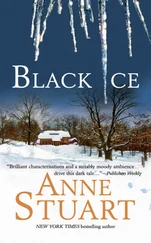Andrew Lane - Black Ice
Здесь есть возможность читать онлайн «Andrew Lane - Black Ice» весь текст электронной книги совершенно бесплатно (целиком полную версию без сокращений). В некоторых случаях можно слушать аудио, скачать через торрент в формате fb2 и присутствует краткое содержание. Жанр: Исторический детектив, на английском языке. Описание произведения, (предисловие) а так же отзывы посетителей доступны на портале библиотеки ЛибКат.
- Название:Black Ice
- Автор:
- Жанр:
- Год:неизвестен
- ISBN:нет данных
- Рейтинг книги:3 / 5. Голосов: 1
-
Избранное:Добавить в избранное
- Отзывы:
-
Ваша оценка:
- 60
- 1
- 2
- 3
- 4
- 5
Black Ice: краткое содержание, описание и аннотация
Предлагаем к чтению аннотацию, описание, краткое содержание или предисловие (зависит от того, что написал сам автор книги «Black Ice»). Если вы не нашли необходимую информацию о книге — напишите в комментариях, мы постараемся отыскать её.
Black Ice — читать онлайн бесплатно полную книгу (весь текст) целиком
Ниже представлен текст книги, разбитый по страницам. Система сохранения места последней прочитанной страницы, позволяет с удобством читать онлайн бесплатно книгу «Black Ice», без необходимости каждый раз заново искать на чём Вы остановились. Поставьте закладку, и сможете в любой момент перейти на страницу, на которой закончили чтение.
Интервал:
Закладка:
‘A neat touch,’ Mycroft admitted. ‘I am quite in awe of whoever created this scenario.’
‘Then why did the man kill himself?’ Sherlock asked, exasperated. ‘What were his reasons?’
‘There,’ Crowe said, ‘we can only speculate, but remember that I thought the man looked ill. He was thin and pale, an’ he’d been seeing a doctor. Let us suppose that he was poor an’ he was dyin’ of something like consumption, or a cancer. Let us suppose that someone currently unknown to us approached him an’ offered him a deal. This unknown person would pay his family a large sum of money if the man would anticipate his own death by a few weeks, kill himself in service of this unknown man. This dyin’ fellow agrees, an’ is kitted out with a decent suit, a case containin’ a real knife an’ an ice knife, an’ instructions as to what to do.’
‘Which does raise the question,’ Mycroft interrupted, ‘as to how he rendered me temporarily insensible so that he could place the knife into my hand.’
‘What do you remember?’ Crowe asked.
Mycroft closed his eyes to recall. ‘The man came in, and put his case on the table. He was coughing. I asked whether there was anything I could do to help. He said no, and added that he had some medicine that would help him breathe more easily. He reached into his jacket and took out a small bottle. The top was oddly shaped, more like a button than a cap. He asked me to give him a hand. I walked over to him, and… nothing. The next thing I remember is hearing you knocking on the door.’ He paused, then went on, ‘And a smell. I remember a smell. Heavy, and very bitter.’
‘Ah venture,’ Crowe said, ‘that the medicine bottle was actually a pump spray of an alcoholic tincture of opium. He sprayed it in your face, rendering you insensible for a few moments. Your loss of memory would be consistent with being drugged in this way. This gave him enough time to set the scene.’
An alcoholic tincture of opium, otherwise known as laudanum – the same thing that Baron Maupertuis had drugged Sherlock with in order to take him from England to France. Sherlock still remembered the deep unconsciousness, the dreams and the loss of memory that accompanied his drugging. And the strange, almost pleasant, feeling of lassitude. He shook the memories away. This was no time to reminisce.
Crowe continued: ‘If found, by the police or the pathologist, it would be assumed that he carried it around for his own purposes. Perhaps even to dull the pain of the disease that was killing him.’
‘What happened to it?’ Mycroft asked.
‘Sherlock took it.’ Crowe shrugged. ‘Better that than the police losing it.’
Mycroft nodded. He thought for a moment. A spray that can render people momentarily insensible. How very interesting. I can think of several official and semi-official uses for that.’
‘All right.’ Sherlock paused, trying to arrange his thoughts. ‘We know how it might have been done. We have a theory that fits all the facts. The question is: why? Why was it done?’
Mycroft shrugged. As to that, I am engaged with several difficult negotiations with foreign governments. Perhaps one of them wishes to get me out of the way for a while so that they can gain some advantage. Alternatively, work I have been engaged in previously has several times led to treaties being signed with one country rather than another. Perhaps those other countries have taken exception to my actions, and have decided to extract some form of revenge.’ A thought occurred to him. A serious thought, judging by the expression on his face. ‘Except
‘Except what?’ Crowe asked.
Instead of answering, Mycroft reached inside his jacket. ‘I still have the card the dead man gave to Brinnell. There was something written on it. Something that made me interested in seeing him.’
He pulled a slip of cardboard from his inside pocket. ‘John Robertshaw,’ he read, ‘along with an address in Chelsea – Glassblowers’ Road. Probably false, just created to add veracity to the card.’
‘But worth checking anyway,’ Crowe pointed out.
‘Indeed. I would not want to let a clue get away from us because we dismissed it from our minds.’ He turned the card over. ‘My name, handwritten, so that Brinnell would know who he wanted to see. And three words.’
He glanced up. His eyes met Sherlock’s.
‘The Paradol Chamber,’ he said grimly.
Shocked, Sherlock’s mind flashed back to the time he had spent in the clutches of Baron Maupertuis. The Baron had mentioned the Paradol Chamber. He hadn’t said what it was, but he had referred to it as if he worked for it, or reported to it. As if it was something important, and secret.
‘I remember now,’ Mycroft continued. ‘I saw the words, and I remembered what you had said about hearing Baron Maupertuis use the same phrase. I had Brinnell bring the man in so that I could question him. But this card was the bait in a trap.’
‘And you took it,’ Crowe observed mildly.
‘In my own defence,’ Mycroft protested, ‘I was on familiar territory, and not expecting an attack.’
‘And yet it came.’ Crowe waved a large hand. ‘No matter. We must move on. Ah will secure a solicitor for you. Sherlock, do you still have the name and address of the solicitor given to you by the footman at the Diogenes?’
Sherlock nodded, and passed across the slip of paper which he had kept in his shirt pocket.
‘And you, Sherlock,’ Crowe continued, ‘will investigate this calling card.’ Crowe handed over the card that Mycroft had retrieved from his jacket. Sherlock turned it over, and read the ominous words The Paradol Chamber with a shiver.
‘How do I do that?’ Sherlock asked.
‘Smell the card,’ Crowe instructed.
Sherlock raised it to his nose. There was a slight but noticeably sharp odour. ‘What is it?’ he asked.
‘Printer’s ink,’ Crowe replied. ‘The card has been freshly made, probably as a one-off, just to get the man into the club. No respectable club would admit a man without a card, after all. He wouldn’t have any cards himself, given his station in life, and his mysterious employer would hardly have given him one of his own. No, it was made recently, which means it was made locally’ He turned to Sherlock’s brother. ‘Mister Holmes, how many printers are located in the vicinity?’
Mycroft thought for a moment. ‘I can think of four, all of them in the Chancery Lane area. I will give you the addresses.’ He took a scrap of paper and a pen from his pocket and began to write.
‘Check each of the printers,’ Crowe instructed Sherlock. ‘See if they recognize the card. See what they can tell you about the man who had it printed.’
‘All right.’
‘And meet me back, oh, outside the Sarbonnier Hotel in two hours. You remember where that is?’
‘The place we stayed the last time we came to London? Yes, I remember.’
‘Good.’
The door swung open as Crowe was speaking. ‘Time’s up,’ the constable said. You gentlemen have to go.’
‘Don’t worry, Mycroft,’ Crowe said. ‘We will get you out of here.’
‘I just hope that happens before dinner time,’ Mycoft replied with a wan smile. ‘I have missed luncheon, but I am not sure that the food here will be up to my usual standards.’
He extended a hand to Sherlock. ‘Try not to think of me like this,’ he said.
‘Here, or in the club, or anywhere else,’ Sherlock said, taking Mycroft’s hand, you are my brother. You take care of me. Now it’s my turn to take care of you – if I can.’
‘You can,’ Mycroft said. ‘And you will. I know that once you set your mind to something, it gets done. That is a trait we both inherit from our father.’
The constable coughed, and Sherlock reluctantly followed Amyus Crowe from the cell.
Читать дальшеИнтервал:
Закладка:
Похожие книги на «Black Ice»
Представляем Вашему вниманию похожие книги на «Black Ice» списком для выбора. Мы отобрали схожую по названию и смыслу литературу в надежде предоставить читателям больше вариантов отыскать новые, интересные, ещё непрочитанные произведения.
Обсуждение, отзывы о книге «Black Ice» и просто собственные мнения читателей. Оставьте ваши комментарии, напишите, что Вы думаете о произведении, его смысле или главных героях. Укажите что конкретно понравилось, а что нет, и почему Вы так считаете.
